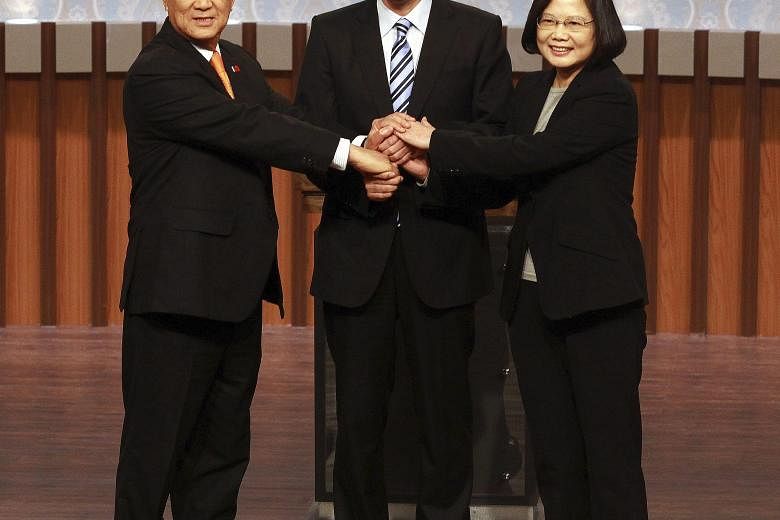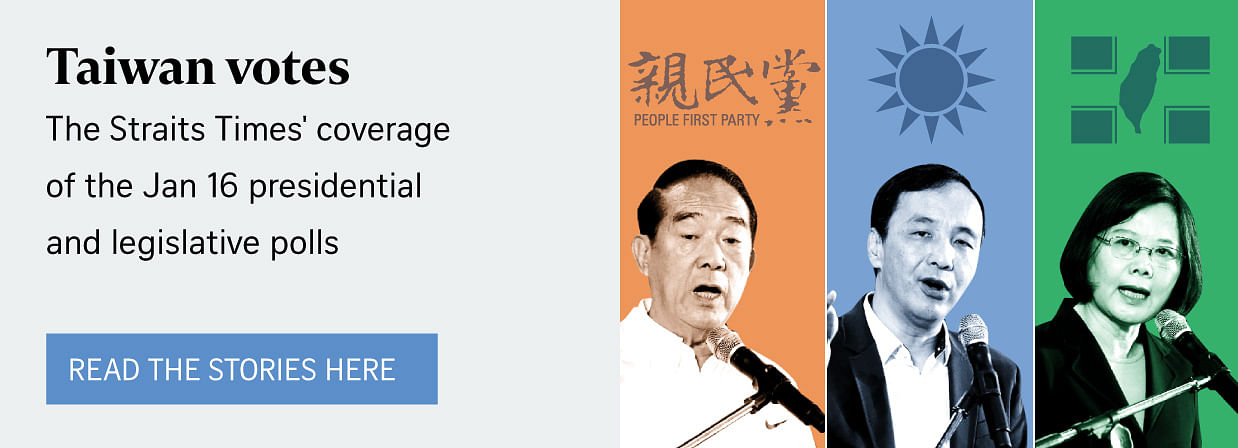TAIPEI - Taiwan's opposition leader and presidential front runner called on China to respect the island's democratic process and said she believes Beijing will have a "rational attitude" when dealing with her independence-leaning party.
Ms Tsai Ing-wen, chairman of the Democratic Progressive Party (DPP), made the comments yesterday in the first live, televised presidential debate, with three weeks to go before Taiwan votes in a new president and Parliament.
Ms Tsai, with a double-digit percentage lead in opinion polls, has moved carefully in discussing how she will engage China if the DPP returns to power, as it is likely to do next year.
The party has traditionally favoured the island's formal independence and says it believes only Taiwan's people can decide its future. China, which considers Taiwan a renegade province and part of its territory, takes this to mean it wants independence.
"Everything can be discussed," said Ms Tsai on political relations with Beijing during the debate, the first of two that will be held before the Jan 16 vote.
"This is a rational approach and I believe China will also take a rational attitude in interactions with the DPP."
She said that political party rotation is part of Taiwan's democratic society. China's leaders should "recognise this is the reality of Taiwan's democratic way of life and give it certain respect".
Ms Tsai is one of three presidential contenders, who also include Mr Eric Chu, chairman of the ruling Kuomintang, and Mr James Soong, chairman of the People First Party, a KMT splinter.
A December poll of 1,031 adults by cable news network TVBS showed Ms Tsai leading the race with 46 per cent support, while Mr Chu and Mr Soong trailed with 26 per cent and 10 per cent respectively. Undecided voters made up 17 per cent.
Fears over Beijing's influence on the island have grown since a rapprochement took root under the KMT, culminating in a landmark meeting between current President Ma Ying-jeou and Chinese President Xi Jinping in Singapore last month.
Public unease over closer relations is a major factor behind the KMT's dwindling popularity and which Ms Tsai leveraged on yesterday. "We need to be comprehensively linked to the major global economies, and not just solely tied to China," she said, arguing that the KMT had given Taiwan only "one option".
Mr Chu criticised her for being unclear on her cross-strait strategy.
"Tsai said she will not provoke China and there will not be surprises, but she is still being vague," he countered.
Beijing insists any new leader must recognise the "1992 consensus" - a tacit agreement between the KMT and China which says there is "one China" with different interpretations.
The DPP has never recognised the agreement and Ms Tsai remained circumspect yesterday.
"I believe cross-strait relations can remain stable... the 1992 consensus is an option, but it's not the only one," she said.
Some analysts said she was taking a softer line, assuaging China and major ally the United States, which does not want to see increased tension in the region.
"She is sending a message not only to voters in Taiwan, but also China and the US, that she is willing to communicate," said Professor Shih Cheng-feng, a political analyst at National Dong Hwa University.
Others said there was little concession.
"She says nothing about 'one China', which is the crucial part of the 1992 consensus," said Dr Jonathan Sullivan, a China specialist at the University of Nottingham.
Mr Soong, a conservative political veteran, said China and Taiwan should "seek common ground", but urged Beijing to respect Taiwan's sovereignty.
REUTERS, AGENCE FRANCE-PRESSE, BLOOMBERG


